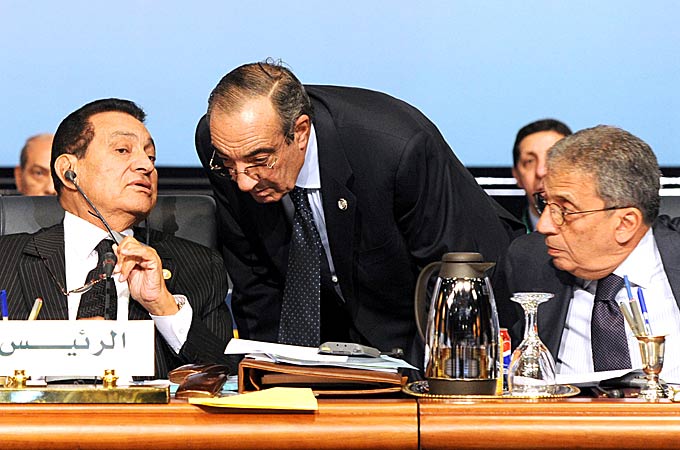Arab leaders warned of ‘revolution’
Arab League chief warns regional leaders that recent political upheaval is linked to deteriorating economic conditions.

 |
|
Hosni Mubarak, the Egyptian president, made no reference to the Tunisian revolt in his opening speech [EPA] |
The head of the Arab League has told the region’s leaders that the recent upheaval in Tunisia is linked to deteriorating economic conditions throughout the Arab world, warning them that their people’s anger has reached unprecedented heights.
Amr Moussa told an Arab economic summit in Egypt that “the Arab soul is broken by poverty, unemployment and general recession.”
“This is in the mind of all of us,” Moussa said in his opening address to the 20 Arab leaders and other representatives of Arab League members gathered in the Red Sea resort of Sharm el-Sheikh.
The summit is the first top level Arab meeting since protests fuelled by joblessness and other economic woes in Tunisia forced Zine El Abidine Ben Ali, the president, to flee, bringing an end to his 23-year rule of the country.
The unrest has helped inspire similar protests around the Arab world and calls for political change, although activists in many countries face security forces heavily vested in maintaining the status quo and governments that refuse to allow dissent.
“The Tunisian revolution is not far from us,” Moussa warned. “The Arab citizen entered an unprecedented state of anger and frustration.”
He called for an Arab “renaissance” to lift people from their frustration.
Billion-dollar fund
The meeting in Egypt was originally intended as a platform to discuss trade, business and investment, but has been overshadowed by the revolt in Tunisia and its reverberation around the region.
Thousands of people have demonstrated in Jordan, Egypt, Sudan, Oman, Libya and Yemen recently over the economic situation in their respective countries, some explicitly in solidarity with the Tunisians.
A rash of attempted self-immolations has also struck Egypt, Algeria and Mauritania, with protesters seeking to copy Tunisian Mohammed Bouazizi, the 26-year-old whose set fire to himself and helped inspire the protests that toppled Tunisia’s president.
Mindful of those events, Arab leaders at the summit committed to a proposed $2bn programme to boost faltering economies that have propelled crowds into the streets to protest against high unemployment, rising prices and rampant corruption.
Sheik Sabah al-Ahmed al-Jaber al-Sabah, the Kuwaiti ruler, said the fund will “contribute to creating new job opportunities for young Arabs” at a time when the Arab world is witnessing “unprecedented historical crisis”.
The idea of the fund was first suggested by Kuwait during the economic summit it hosted in 2009, but the proposal has been slow getting off the ground – like many Arab League initiatives requiring members to pledge money.
Oil-rich Saudi Arabia and Kuwait have promised to pay $500m each and, after the economic-related unrest in Tunisia, additional pledges are pouring in.
It is not immediately clear how these funds would be dispersed and who qualifies to benefit from them.
‘Basic demand’
Hosni Mubarak, the Egyptian president for three decades, made no reference to the Tunisian revolt in his opening speech but acknowledged economic development and co-operation had become a national security priority.
“We have realised that the priority of economic co-operation and development is no longer just about progress for our people … but a basic demand of Arab national security,” he said.
Among other developments at the summit, Arab leaders voiced their “total rejection” of foreign interference in Arab affairs, especially over the region’s Christian minorities.
“Arab kings and presidents … express their total rejection of attempts by certain states and foreign parties to intervene in Arab affairs in the name of protecting the minorities of the East,” they said in a final statement at the end of the summit.
This “demonstrates a regrettable lack of understanding of the nature of the terrorist acts … and a harmful ignorance of the history of the people of the region,” it read.
The statement came in response to repeated Western calls for the protection of the Arab world’s Christian communities after two deadly attacks on churches in Egypt and Iraq.
‘Stand alongside Jerusalem’
Palestinian officials at the summit also criticised Arab states for paying only a fraction of funds pledged to sustain Palestinian life in Jerusalem.
Foreign minister Riad Malki’s comments reflected the Palestinians’ frustration over the Arab failure to support them in the face of what they see as an Israeli campaign to “Judaize” Jerusalem, the city at the heart of the Middle East conflict.
Addressing the summit, Salam Fayyad, the Palestinian Authority prime minister, said the city faced a “bitter reality” and urged the leaders to implement their previous resolutions on supporting Jerusalem.
“We are looking to you, brothers, to stand alongside Jerusalem”, he said.
Malki, in an interview with the official Palestinian news agency WAFA, said the Palestinians had so far received only $37m of $500m pledged by Arab leaders at a summit in Libya in 2010.